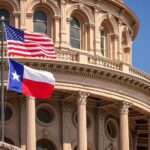Wisconsin bill seeks to legalize statewide online sports betting

A bipartisan group of Wisconsin lawmakers has introduced a bill that would legalize online sports betting across the state by routing wagers through servers located on tribal land.
Under the Wisconsin Constitution, gambling is permitted only on tribal territories. The proposed ‘hub-and-spoke’ model would let residents place bets anywhere by connecting to servers based on tribal property.
This system was first implemented in Florida in 2021 and later upheld by the D.C. Court of Appeals after a legal challenge.
Speaking to Wisconsin Public Radio, State Sen. Kristin Dassler-Alfheim said the measure could raise gambling tax revenue by about 10%. She added, “Really, it’s just giving everyone access to the online markets that the rest of the country is enjoying, that our state has not had access to via the [hub-and-spoke].”
The bill comes amid a lawsuit filed by Wisconsin’s Ho-Chunk Nation, claiming that companies like Kalshi and Robinhood are operating illegal gambling platforms in the state. Kalshi has maintained that it functions as a federally regulated financial marketplace, not a sportsbook.
According to the National Council on Problem Gambling, gambling participation and addiction rates are rising nationally. The council estimates that up to 10.5 million US adults meet the criteria for a gambling disorder.
Dassler-Alfheim said that expanded access won’t change the need for support services, explaining, “That doesn’t change with access to this tool. It is the rest of the people who are just using it for entertainment that we’re allowing to have access.”
Abi Bray brings strong researching skills to the forefront of all of her writing, whether it’s the newest slots, industry trends or the ever changing legislation across the U.S, Asia and Australia, she maintains a keen eye for detail and a passion for reporting.
Verticals:
Sectors:
Topics:
Dig Deeper
The Backstory
Why the push is happening now
Wisconsin’s latest bid to authorize statewide online sports betting is the product of converging political, technological and competitive pressures. Lawmakers are attempting to reconcile the state’s constitutional limits on gambling with consumer demand for mobile wagering and the practical reality that residents can already access out-of-state apps. The proposed hub-and-spoke model would keep betting servers on tribal land while opening digital access statewide, echoing an approach tested elsewhere and designed to fit within Wisconsin’s compacting framework. The effort arrives as tribal casinos have moved to modernize on-site sportsbooks and as policymakers weigh how to channel untaxed activity into a regulated market with clearer oversight and responsible gambling guardrails.
The plan also reflects an effort to balance revenue ambitions with sovereignty commitments. Wisconsin’s tribal operators already control on-premise sports betting under existing compacts, and the bill’s architecture keeps tribes at the center of any online expansion. Supporters say the model aims to meet consumers in the channels they use without inviting a disruptive reshaping of market control. Opponents warn that anywhere, anytime wagering could increase harms. The debate mirrors national trends, but Wisconsin’s constitutional constraint — gambling permitted only on tribal territories — gives the conversation a distinct shape and a narrower set of policy levers.
What has changed since on-premise launch
The groundwork for a broader digital market has been laid over the past year as tribal operators upgraded technology and user experience for on-site betting. Potawatomi Casino Hotel opened its sportsbook in Milwaukee and enabled on-premise mobile wagering tied to its properties. That infrastructure is now being reinforced through a multiyear technology agreement. In June, Potawatomi said player account management provider White Hat Gaming would support its mobile sports betting platform, integrating payments, real-time risk monitoring and its Traveling Wallet tool to let customers use one account across jurisdictions. The deal, outlined in Potawatomi’s partnership announcement, suggests operators have been building the backbone needed for a wider rollout if lawmakers open the digital door statewide.
Even without statewide mobile access, policymakers have been signaling a shift. A separate write-up on the proposal emphasized that the bill would authorize tribes to launch their own apps so long as servers sit on tribal land, while national brands like DraftKings and FanDuel would remain excluded unless licensed under tribal agreements. That framing, detailed in a companion report on the bipartisan bill, underscores that Wisconsin’s path to online betting runs through tribal operators, not commercial sportsbooks. Public health research cited by lawmakers also points to heightened risks with digital access, including evidence that some users overspend more easily online, a data point likely to shape compliance requirements and funding for problem gambling programs if the bill advances.
Sovereignty, lawsuits and the path to a hub-and-spoke
The hub-and-spoke concept takes shape against a backdrop of legal friction and economic pragmatism. Tribal sovereignty anchors Wisconsin’s gaming landscape, and routing all online wagers through servers on tribal land attempts to preserve that principle in a mobile era. That design also seeks to inoculate the system against legal challenges by aligning activity with constitutional allowances, a lesson drawn from other states that tether mobile bets to tribal infrastructure.
At the same time, litigation has sharpened the urgency. A lawsuit by the Ho-Chunk Nation claims that finance-linked platforms are offering illegal gambling products in the state, a sign that market boundaries are blurring as innovation outpaces rules. The bill’s backers contend that a clear, regulated channel would reduce gray-area activity and keep revenue and consumer protections in state. Tribes, for their part, are positioned to benefit if digital betting scales through their networks, but they also shoulder reputational and compliance risks if responsible gaming efforts lag consumer adoption.
Lessons from other statehouses
Wisconsin is not moving in isolation. Across the country, legislatures are continuing to expand or refine sports wagering, often through constitutional or compact-based pathways that require tight alignment among stakeholders. In Texas, a lawmaker filed a constitutional amendment to put sports betting before voters, the latest in a series of attempts to join the 38 states that already allow it. The proposal, noted in coverage of the Texas resolution, reflects a state trying to corral extensive out-of-state app usage into a regulated framework. The pitch there leans on voter approval and a tax structure, signaling the political calculus in markets where commercial operators would likely lead.
Hawaii offers a different template. With no land-based casinos, the state’s Senate advanced a bill that would create a mobile-only market with at least four licenses, a 10% levy on operator profits and dedicated funding for problem gambling programs. If enacted, Hawaii would become the 40th state to authorize sports betting, according to reporting on its legalization push. The timeline laid out there — enactment slated for July 1, 2025, and launch by Dec. 31, 2025 — highlights the operational grind that follows passage. Licensing, rulemaking and technology certification typically take months, and Wisconsin would face similar sequencing even with prebuilt tribal systems.
Consumer protection and the political sell
Supporters of Wisconsin’s model argue that aligning with most U.S. states on mobile access could curb unregulated play and capture revenue now leaving the state. They also say a tribal-led system would preserve sovereignty while enabling modern features like same-game parlays and in-game betting that are standard elsewhere. Yet public health advocates caution that making wagering as accessible as a ride-hailing app changes behavior. Research cited in the related Wisconsin article found that a notable share of online gamblers report overspending more easily and view digital betting as more addictive than in-person play.
Those findings are resonating beyond U.S. borders. India’s Supreme Court recently asked the central government to respond to a petition seeking a nationwide ban on online gambling, reflecting growing anxiety about platforms that blur lines between gaming and wagering. The proceeding, outlined in coverage of the Indian court’s request, underscores a global regulatory debate that U.S. states increasingly must address at home — how to police product design, payments and advertising in a sector that scales rapidly once moved online.
What to watch next
The legislative path in Madison will hinge on whether backers can convince colleagues that the hub-and-spoke structure is both legally durable and operationally ready. Tribes have been investing in the pipes, as the Potawatomi-White Hat partnership shows, and they would likely move first if authorized. Rulemaking would need to define identity verification, geolocation, risk controls and data-sharing standards, with funding earmarked for prevention and treatment programs given national increases in gambling participation and addiction.
Experience from other states suggests the political coalition has to span revenue hawks, public health advocates and tribal leaders. The Wisconsin bill attempts that balance by elevating tribal control, excluding national brands absent tribal alignment and promising guardrails. The stakes are substantial: a chance to formalize a market already active in the shadows, or a step that could widen access and risk without adequate oversight. Whether Wisconsin joins the many states permitting mobile betting — like those pursuing legalization in Texas and Hawaii — will turn on how lawmakers resolve those trade-offs in the months ahead.








